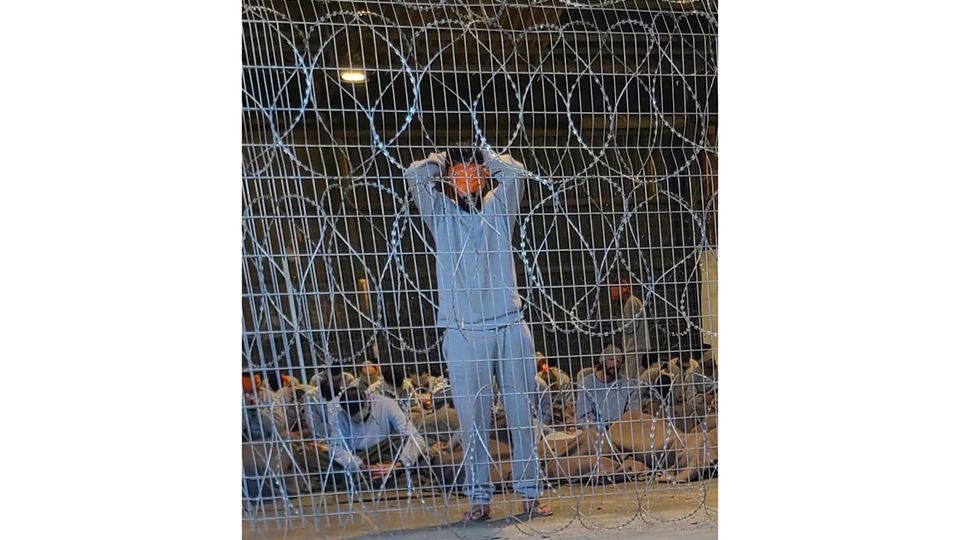
A Palestinian with raised arms in the Sde Teiman military base. According to an Israeli whistleblower, the prisoners may not move or speak to each other, otherwise they are beaten.
Foto: AP
At first, Jawad Sakhir Obaid doesn’t want to talk about what was done to him, saying he is too ashamed. Then, the 17-year-old starts talking anyway. “They took my masculinity.” He is still suffering from the treatment he says he received at the hands of Israeli soldiers: Insults, beatings – and sexualized violence. He tells his story at a meeting in the Deir al Balah refugee camp in the middle of the Gaza Strip.
His father, his five older brothers and he were detained by the Israeli military in late February. The soldiers, he says, discovered a tunnel near their home in Zaitoun, a district of Gaza City, and immediately arrested them. At first, they were locked up in a neighboring home. After a few hours, they were made to undress and sit in a hole in the ground. It was cold, he says, and the soldiers poured water on them and urinated on them. Then, says Obaid, they tied him up, blindfolded him, cut open his underwear with a sharp object and shoved a wooden stick into his anus. He says he begged them to stop.

The article you are reading originally appeared in German in issue 24/2024 (June 8st, 2024) of DER SPIEGEL.
After that, he says, he was brought to a military camp and detained for 18 days. The soldiers there interrogated him over and over again, asking him about his family members, his neighborhood and Hamas. And they repeatedly hit him in the head and upper body, he says, adding that he still has nightmares.
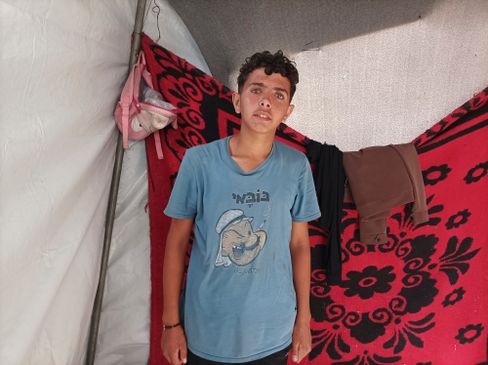
Palestinian teenager Jawad Sakhir Obaid after his release.
Foto: Ghada Alkurd / DER SPIEGEL
The details of the story told by the 17-year-old cannot be confirmed. But Obaid’s story is similar to those told by six other former detainees in Israeli internment camps with whom DER SPIEGEL spoke following their release.
Because the Israeli government has barred international journalists from entering the Gaza Strip, DER SPIEGEL works together with Palestinian journalists. The interviews in Gaza were conducted by our colleague Ghada Alkurd, and her meetings with the former detainees have been documented. She works as a freelance journalist for Western media outlets like the Swiss public broadcaster and the BBC and also for the Independent Commission for Human Rights , a Palestinian human rights organization. The identities of those interviewed along with the plausibility of their stories have been checked.
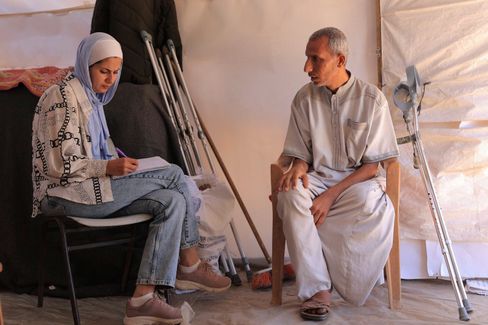
DER SPIEGEL journalist Ghada Alkurd speaking to the released prisoner Abu Salah in the Gaza Strip.
Foto: DER SPIEGEL
In addition, DER SPIEGEL has examined reports by Israeli non-governmental organizations and the UN, and has spoken with Israeli whistleblowers, humanitarian aid workers and human rights activists. The picture that has emerged is that the abuse and torture of prisoners from the Gaza Strip is systematic. On Thursday, the New York Times also published an investigation into the matter. The findings are largely consistent with our own.
Prime Minister Benjamin Netanyahu has repeatedly said that the Israeli military is “the most moral army in the world.” It is the view taken by many Israelis – a majority of them spent many years of their lives serving in the military, after all. The reports from the detention centers, however, give the impression that the soldiers may be violating international humanitarian law. Protecting prisoners of war is not a trivial matter. It is a core element of the Geneva Conventions, which were adopted by the international community following the world wars.
Israel refers to the prisoners as “unlawful combatants” – and denies them almost all rights
Israel, however, refers to fighters from Hamas and other groups as “unlawful combatants”: Because the conflict is not international in nature and because these fighters did not conform to the laws of war, according to the argument, they can be denied the rights normally afforded to prisoners of war.
Accusations that prisoners have been tortured and killed could also play a role in a case before the International Criminal Court (ICC). The court’s chief prosecutor applied for arrest warrants for the Hamas leadership and for Israeli Prime Minister Netanyahu and Israeli Defense Minister Yoav Gallant for possible crimes committed in the war in Gaza.
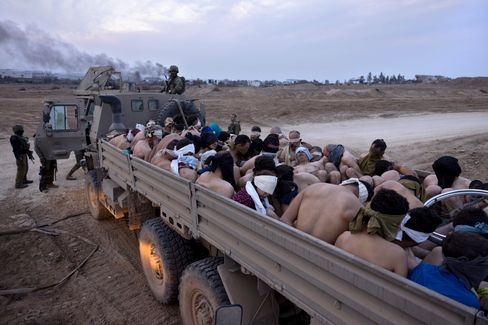
Palestinian detainees in the Gaza Strip in December 2023. One prisoner says they were treated “like cattle.”
Foto: Moti Milrod / AP
Images of mass arrests in the northern Gaza Strip were first published on social media in December. They showed half-naked, blindfolded men with hands tied kneeling on the ground, locked inside an improvised prison in a Gaza City football stadium, and packed onto the bed of a military truck. One of the detainees told the Times of Israel that they had been treated “like cattle.” Referring to the soldiers, he said: “We could feel their hatred.”
Most of the detainees were brought to the Sde Teiman military base near Be’er Sheva, around 30 kilometers east of the Gaza Strip. Following the brutal massacre in Israel perpetrated by Hamas and other terrorist groups on October 7, it was expanded into the central detention center for prisoners from Gaza. Satellite images taken this spring show numerous new buildings on the base.
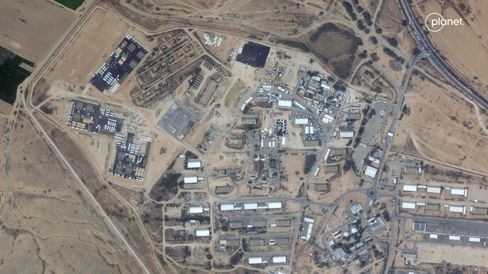
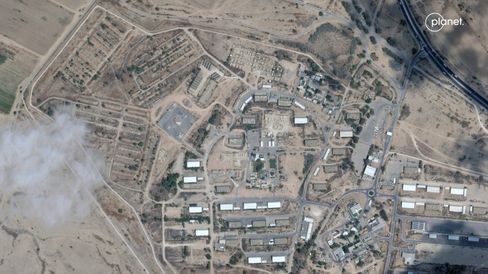
The military base Sde Teiman on September 10, 2023 and on April 18, 2024. Several new buildings were erected.
Foto: Planet Labs PBC / Planet Labs PBC
Following petitions submitted by human rights organizations, Israel’s Office of the State Attorney issued a statement this week that 700 prisoners have been transferred to other detention centers, with 500 more to follow in the weeks to come. Some 200 prisoners are to initially remain in Sde Teiman.
According to numerous sources, abuse and torture don’t just take place in Sde Teiman, but are widespread. One reason is the lack of legal protections for the detainees. With Israel’s parliament, the Knesset, having tightened regulations pertaining to “unlawful combatants” after October 7, the military is allowed to hold Palestinians for 45 days without an arrest warrant. Furthermore, they have no right to legal representation or a speedy trial.
According to information provided by Israel, 4,000 “unlawful combatants” from Gaza have been detained in Israel, with around 1,500 of them already released.
It stank so bad in the detention camp that some guards wore masks
DER SPIEGEL spoke with an Israeli reserve soldier who served in Sde Teiman about half a year ago. He asked to remain anonymous, though DER SPIEGEL knows his name and has confirmed both his membership in the military unit that served at Sde Teiman and his period of service. His account is similar to reports published in the Israeli daily Haaretz, the U.S. broadcaster CNN and the German public broadcaster ARD.
The soldier says that prior to being stationed in Sde Teiman, he had heard from other reservists: “There is an expectation there that you have to beat the prisoners.”
He describes corrugated metal buildings divided into individual holding pens for the prisoners using fencing and razor wire. Up to 100 prisoners were crammed into each holding pen, he says. Photos taken secretly, which DER SPIEGEL has obtained, shows men in gray training suits with their hands tied and eyes bound. Most of them are sitting on thin mattresses or on the concrete floor, with a couple of them standing and holding their hands up – apparently stress positions that some were required to hold for hours at a time, according to the reservist. Videos from Sde Teiman circulate among soldier chat groups showing such stress positions and soldiers making fun of the prisoners. DER SPIEGEL was able to see them, but to protect the source, we have chosen to refrain from describing the videos in more detail.
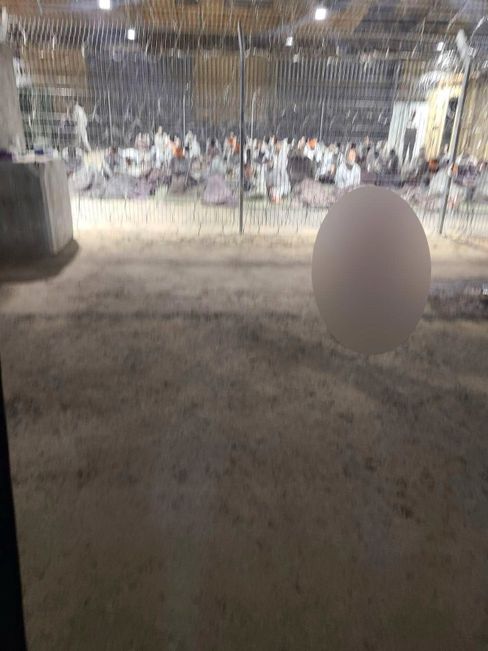
Palestinians being held inside the Israeli military base Sde Teiman.
The reservist says that the detainees are not allowed to talk or to move. “And if they do, they are pulled out and beaten.” He says all he heard was whimpering, crying and gasping – constantly. Inside the building, it stank so bad that some guards wore masks, says the reservist.
And it smells even worse in the hospital ward at Sde Teiman, he says – “like rot and death.” The patients are chained to their beds, he says, and wear blindfolds and diapers – and they are also not allowed to move. None of the doctors or medics on duty were able to effectively communicate with the wounded detainees, the reservist says, “because none of them spoke Arabic.” They were hardly given any pain medication. The reservist says that one medic told him that medical practices could be tested in the hospital ward that specialist doctors would otherwise be unable to perform. “Everything is allowed here. If something goes wrong, nothing will happen to you.”
One doctor said that amputations due to infection were “routine”
The whistleblower say he got the impression that improper treatments were even desirable in some cases. He says that one prisoner asked him for sufficient anesthesia should he be operated on. During the last operation, he says the prisoner told him, he woke up right in the middle of it.
Another informant who has also asked to remain anonymous, told DER SPIEGEL that he saw “a striking number of amputations” in the camp’s medical ward. Most of those, the source says, lost their limbs as a result of infections caused by zip ties used to tie up the prisoners. In many cases, the zip ties were pulled so tight that they cut into the skin and produced wounds.
A doctor who also served in the hospital ward and subsequently complained to state authorities about the conditions there described amputations in Sde Teiman as “routine.” More than half of the patients were treated due to injuries sustained from the zip ties.
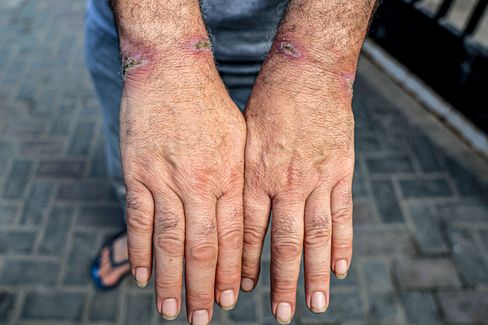
A Palestinian showing wounds on his wrists, likely caused by zip ties.
Foto: Said Khatib / AFP
In a late March letter to the Health Ministry, the Defense Ministry and the Office of the State Attorney, the doctor wrote that because of his work at Sde Teiman, he feels “complicit in the violation of Israeli law” and in the “violation of my basic commitment to patients.” In the letter, the doctor wrote that he had turned to Israeli officials six weeks previously, but there have been “no substantial changes.” The letter, first reported by Haaretz, has been obtained by DER SPIEGEL. The zip ties have apparently since been replaced by metal handcuffs.
The Israeli Health Ministry did not respond to a request for comment submitted by DER SPIEGEL.
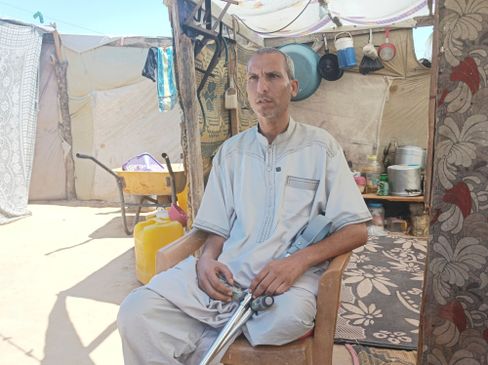
Former taxi driver Abu Salah. He says he was denied treatment for his wounded leg until it was too late.
Foto: Ghada Alkurd / DER SPIEGEL
Sufyan Abu Salah, 43, worked as a taxi driver in Khan Younis before the war. He says that he lost his left leg during his detention. German public broadcaster ARD has aired several reports about his case. Abu Salah says that Israeli soldiers began beating him in an emergency shelter in Khan Younis immediately after he was detained on February 24, after which they would target his injured foot for abuse. Despite his repeated requests for medical treatment, he says, the guards in Sde Teiman didn’t react until it was too late.
Rare showers, no toilet paper and no change of clothes
He says that when he was finally brought to the Sheba Medical Center near Tel Aviv, a doctor presented him with a choice: either his life or his leg. “I was completely alone and desperate. What was I supposed to do?” Abu Salah asks. He was required to sign a form that was written in Hebrew, which he doesn’t understand. After the operation, he was taken back to Sde Teiman, he says, where he was denied pain medication at the hospital ward and wasn’t given crutches either. He says he fell the first time he tried to go to the toilet. “Soldiers laughed at me when I was lying on the ground,” he recalls.
A hospital spokesman replied to a query from DER SPIEGEL that he was unaware of a Palestinian prisoner having been treated at his facility.
Sakhir Obaid, 52, provides a similar description of his detention. He is the father of 17-year-old Jawad, who claims to have been raped with a stick by soldiers. Sakhir Obaid says that he was detained for a total of 54 days, blindfolded and hands tied the entire time. He says he never laid eyes on the men who repeatedly interrogated and beat him. The prisoners, he says, were only allowed to shower once a week and could only go to the toilet twice a day at most. They were not allowed to use toilet paper and were not provided with a change of clothes, he says. Sakhir Obaid says that skin diseases were widespread among the detainees and they hardly ever improved due to the conditions of their detention.
The prisoners apparently weren’t just abused in Sde Teiman and in the other detention centers, but also during transportation to the centers.
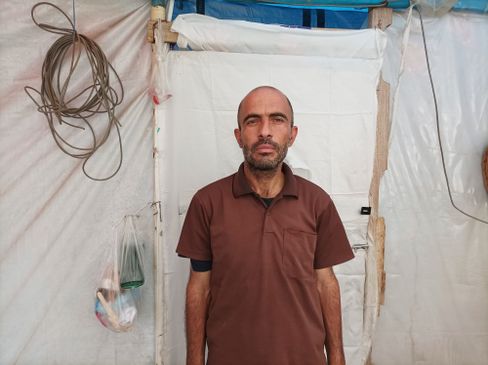
Released prisoner Youssef Hamdiya in the Gaza Strip. He says a soldier spit in his mouth and held it closed until he swallowed.
Foto: Ghada Alkurd / DER SPIEGEL
Youssef Hamdiya, 42, from the Shujaiyah district of Gaza City, says that he was detained in March at Shifa Hospital in the northern Gaza Strip. He and his sons were there, he says, because one of his sons had been injured during a bombing. They then stayed on the clinic grounds along with thousands of others out of fear of air raids.
He says that on the bus to the detention facility, soldiers attacked him almost without pause. “With fists, boots, rifle butts and clubs. They also stubbed out cigarettes on the necks of the prisoners.”
Many former prisoners report targeted beatings to their genitals
In the detention center, says Hamdiya, a soldier spit into his mouth and then held it shut until he swallowed. He says he was also forced to kiss the solder’s boot. Like many others, Hamdiya tells of being hit in the genitals and of dogs being sicced on the prisoners. Reports from the UN and various NGOs note that many released prisoners have bite wounds.
Amputee Sufyan Abu Salah recalls that on the way from Sde Teiman back to the Gaza Strip, he wasn’t told that he was about to be freed. The Israelis did, however, apparently arrange with aid workers in Gaza, he says, because an ambulance from the Palestinian Red Crescent was waiting for him at the Kerem Shalom border crossing. Other released prisoners, though, say that Israeli soldiers simply released them in no-man’s-land without a word – and that the soldiers then fired over their heads to drive them back to Gaza.
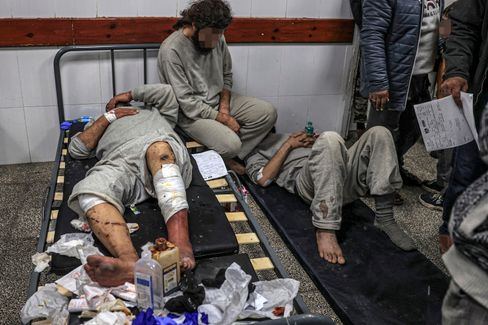
Prisoners in a hospital in Rafah following their release. “You could see from all of them that they went through hell,” says a UNRWA employee.
Foto: Said Khatib / AFP
Aid workers with the United Nations Relief and Works Agency for Palestine Refugees (UNRWA) , who asked to remain anonymous out of fear of possible negative repercussions, say that the first released prisoners appeared completely unexpectedly at the Kerem Shalom border crossing in December. After that, they say, more former detainees would be dropped off there at irregular intervals. “Sometimes it was 150, sometimes 40, sometimes just a handful of people,” says an employee. The organization, he says, developed a procedure to receive them and care for them. Up to May 3, he says, the UNRWA and the International Committee of the Red Cross (ICRC) provided care to a total of 1,731 released prisoners, including 91 women, 46 minors and 118 people who were over the age of 60.
Many of them, says the UNRWA employee, were seriously injured and had wounds or scars from zip ties. There are numerous photos and videos in circulation on the internet of released detainees with such wounds. The clothing of numerous new arrivals, says the employee, were soiled with excrement and most of them were emaciated and seemed weak. “You could see from all of them that they went through hell,” says one employee. Because they were still so disoriented, says the employee, some of them even greeted UN employees on the Palestinian side of the border with the Hebrew “shalom.” None of the detainees had any idea what had been happening in Gaza during the weeks of their detention – or whether their family members were still alive.
Even cancer patients, the blind and mentally handicapped were put in prison
In an internal UNRWA report, which DER SPIEGEL has obtained, former detainees report being beaten on parts of their body that were already injured, the playing of extremely loud music, dog attacks, the holding of stress positions for extended periods of time and sleep deprivation. According to the report, an electric shocker was apparently inserted into the anus of one prisoner, who allegedly later died as a result. Women report being threatened with rape and the bombing of their families in Gaza should they refuse to confess.
Even the demented, cancer patients, the blind and people with mental handicaps were received at Kerem Shalom, according to the report. In addition, dozens of employees of the Palestinian aid organization were apparently arrested by Israel following the October 7 attacks.
According to UNRWA records, 25 agency employees have since been released by the Israelis, with an additional 16 still in detention. In addition, numerous people who worked for the UNRWA on a freelance basis are still in detention. According to UNRWA employees who have been released, the Israelis tried to force them to make false confessions about links to Hamas and participation by UNRWA employees in the October 7 massacre. According to the UNRWA report, one former detainee even said he was waterboarded, a method of torture during which victims believe they are drowning.
UNRWA employee reports they were tortured – even waterboarded in one case
Israel has accused the aid agency of having been infiltrated by Hamas. An independent investigation, however, has refuted many of the accusations.
In addition to UN employees, Israel apparently also suspects medical personnel in particular of cooperating with Hamas or with other terror organizations. The Israeli army has repeatedly besieged and occupied hospitals in the Gaza Strip because they believe that command centers of terror organizations are either inside of them or in tunnels below them. Thus far, though, they have only been able to find a handful of tunnels. One of the medical facilities the Israelis entered was the Shifa Hospital, which was almost completely destroyed in the fighting.
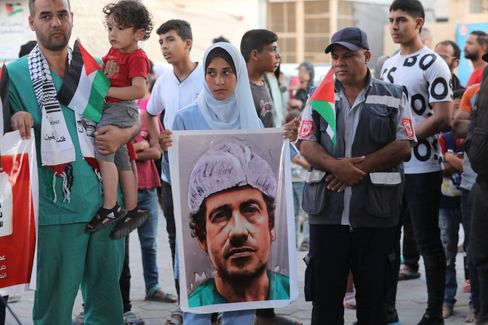
People in the Gaza Strip participating in a protest for the deceased doctor Adnan al-Bursh. “He seemed emaciated, exhausted and frightened,” says a colleague.
Foto: Ali Hamad / APA / IMAGO
The orthopedic department at the hospital used to be led by Dr. Adnan al-Bursh. Photos from early in the war show him providing care to badly wounded children. The doctor was a hero for many people in Gaza. But Israeli soldiers detained him in mid-December and brought him to Sde Teiman.
His colleague, the surgeon Khaled Hammouda, says he encountered al-Bursh there a few days after his arrival. Hammouda says the soldiers had named him, Hammouda, a “shawish,” an assistant. His task was to translate their orders into Arabic, which is why his blindfold had been removed, relates the doctor in a telephone conversation from Cairo, where he fled after his release.
Hammouda says that he lost 14 members of his family when the building where they lived was bombed, including his father, two brothers, his wife and his daughter. When he encountered Adnan al-Bursh in Sde Teiman, al-Bursh told him he had treated his mother and that she was doing well, all things considered. Hammouda says he is grateful to al-Bursh for this piece of information.
A well-known doctor dies in detention – Israel refuses to release the body
Al-Bursh, a 53-year-old father of six children, continued to exercise every morning despite the war, according to a CNN report . “But when I encountered him, he was completely changed,” says Hammouda. “He seemed emaciated, exhausted and frightened.” Israeli soldiers, says Hammouda, beat him badly after his detention, and al-Bursh was experiencing pain in his back and chest especially. Hammouda says he was able to find a bit of paracetamol for him.
Hammouda says that the soldiers didn’t react to his pleas to provide adequate medical care to the badly wounded and seriously ill. “They’re Nukhba people. We don’t care if they die,” the soldiers replied, he says. The Nukhba Force is the elite Hamas unit that was largely responsible for the October 7 massacre.
A military spokesman told Haaretz that Adnan al-Bursh was to be transferred after just a few days from Sde Teiman to the Kishon Detention Facility for security prisoners near Haifa. But he apparently died on April 19 in Ofer Prison in the occupied West Bank.
Palestinian prisoners in regular prisons also have hardly any rights anymore
His widow, Yasmin al-Bursh, who only learned of her husband’s death two weeks later from a Palestinian prisoner organization, told the television station Al Jazeera that her husband had nothing to do with Hamas.
To this day, the Israeli Prison Service refuses to supply information on the cause of death or release al-Bursh’s body to his family. With the help of the organization Physicians for Human Rights – Israel (PHR) , Yasmin al-Bursh has submitted a request to a court in Jerusalem for the return of her husband’s body and for an autopsy monitored by the PHR to determine the cause of death.
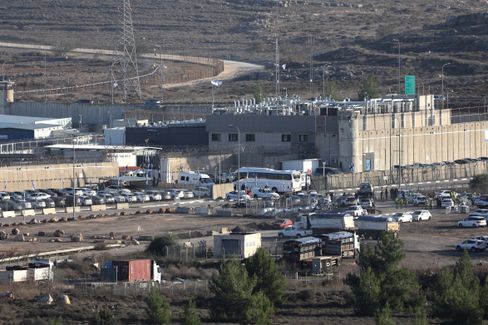
Ofer Prison in the West Bank. Currently, around 9,000 Palestinians are in Israeli detention facilities, about twice as many as before October 7.
Foto: Jaafar Ashtiyeh / AFP
Even before the war, Palestinians in the occupied territories were tried by Israeli military courts – tribunals in which the judges and prosecutors are Israeli soldiers in uniform. Military law applies, which is far stricter. According to the Israeli Prison Service, there are currently more than 9,000 Palestinians in state prisons, around twice as many as before October 7. Some 3,400 of them are in administrative detention, which can last for up to six months and can be ordered without court proceedings. The “unlawful combatants” detained by the military in Gaza are not included in the statistics kept by the Israeli Prison Service.
The accusations made by regular prisoners are similar to those from ex-detainees in Sde Teiman
Despite structural injustices, human rights organizations still had “at least some tools” to protect Palestinian prisoners prior to October 7, says Naji Abbas from PHR. Since then, though, he says, they have hardly even been able to help prisoners in the regular prison system. Here, too, he alleges, neglect and abuse are common.
The state prison authority ordered a kind of “lockdown” for Palestinian security prisoners after the war began. They had to remain in their cells and could hardly have any contact with the outside world, according to a PHR report from February. The report notes that the prisoners generally have no access to electricity and have to sit in darkness for much of the day – and they are only able shower and change their clothes every few weeks. Meal portions, the report says, are inadequate and chronically ill prisoners are denied treatment and medicine.
Since October 7, PHR representatives have been present for the autopsies of five deceased prisoners. It at least two cases, the doctors found signs of torture. Serious preexisting illnesses also went untreated, according to the report. One prisoner died because he had been refused the special diet he needed due to a known, chronic digestive-tract illness. During the autopsy, doctors discovered that a 15-centimeter-long section of his intestine had been torn open, says Naji Abbas. “He must have suffered from terrible pain for weeks.”
Israeli National Security Minister Itamar Ben-Gvir wanted to curtail prisoner rights even before the war
The PHR report provides a detailed account of the use of violence by guards in the national prison system, including beatings with blunt objects, sleep deprivation, threats of dog attacks and being urinated on.
In its response to a DER SPIEGEL query, the Israeli Prison Service stated: “All prisoners are detained in accordance with the law. All required basic rights are applied without exception by professionally trained prison guards. We are unaware of the allegations you describe.”
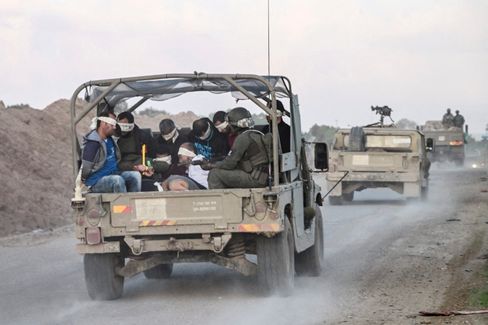
A military transport carrying Palestinian prisoners out of the Gaza Strip. “After October 7, we experienced rhetoric becoming reality,” says human rights activist Tal Steiner.
Foto: Yossi Zeliger / REUTERS
Tal Steiner of the Public Committee Against Torture in Israel (PCATI) , an additional Israeli human rights organization, says that Israel’s right-wing national security minister, Itamar Ben-Gvir, had sought to curtail the already limited rights of Palestinian prisoners even before the war. “After October 7, we experienced rhetoric becoming reality.”
PCATI has appealed to the Supreme Court due to the law on the treatment of “irregular fighters” and has presented possible proof of torture to the State Attorney. Already two years ago, says Tal Steiner, her organization submitted evidence of abuse and torture in Israeli prisons to the chief prosecutor of the International Criminal Court. The organization says that the deaths of prisoners in Israeli detention facilities isn’t even being documented at the moment. That, says Steiner, could constitute the offense of “enforced disappearance,” which is a crime against humanity.
The Red Cross continues to have no access to the detention facility
Alice Jill Edwards , the UN special rapporteur on torture, recently issued a statement in which she expressed concern about “this emerging pattern of violations, coupled with an absence of accountability and transparency” in Israel.
The Israeli government does not allow representatives of the ICRC to visit Sde Teiman and other detention facilities. Last week, Israel did announce however that it would revise the law pertaining to the treatment of “unlawful combatants” and allow future visits to the facilities by politicians and representatives of the judiciary. In response, PCATI issued a statement saying that there is “no replacement for visits from experts who are trained to protect victims – ICRC employees and lawyers who are not representatives of the state.” The Israeli military also announced it would establish a commission to examine the conditions at military detention facilities. The deaths of 48 Palestinians in military detention are also to be investigated, the military said. Haaretz has reported that 36 of them had been detained in Sde Teiman.
DER SPIEGEL requested a statement from the Israeli military on the accusations of torture and abuse. In response, the military denied the use of sleep deprivation and the playing of loud music. Diapers are only used when prisoners are not able to go to the toilet on their own, the statement claimed. In instances where soldiers have “not behaved as expected,” they have been dismissed. The military did not respond to specific accusations made by our interview partners but wrote that they had been passed along to the military police for review.
Israel’s reaction following October 7 was similar to that of the U.S. after September 11
The stories from Sde Teiman are reminiscent of the notorious prison Abu Ghraib in Iraq, where U.S. soldiers tortured detainees 20 years ago. U.S. President George W. Bush had promised Iraq freedom and democracy after toppling the country’s dictator Saddam Hussein. But it is the images of the tormented prisoners from Abu Ghraib that continue to define the image of the U.S. in the region today – and which have become a symbol of moral failure.
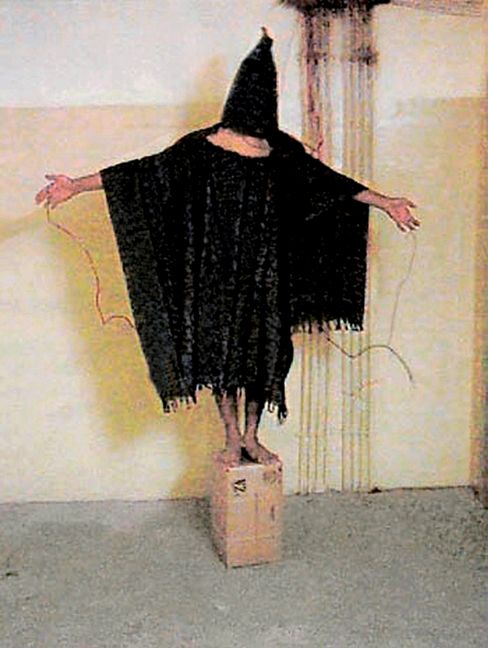
A torture victim at the Abu Ghraib prison in Iraq in May 2004. For many Israelis, October 7 was what September 11 was for Americans.
Foto: The New Yorker / REUTERS
Israel’s reaction following the massacre of October 7 now seems similarly excessive to that of the U.S. after September 11.
“In Sde Teiman, there is a constant atmosphere of revenge,” says the Israeli whistleblower who provided DER SPIEGEL with a detailed account of the conditions there.
“Many people here went off the rails after October 7,” says Tal Steiner of PCATI. The atrocities committed by the terrorists from the Gaza Strip, she says, shocked many Israelis to such an extent that they became “numb” to the suffering of the Palestinians. Not a few Israelis also apparently feel, she says, that the horrific acts of October 7 are enough to justify cruelty. “But since when do the standards of the terrorist organization Hamas apply in Israel? Is this the state we want to live in?”
Regarding the announcements that prisoners are being transferred out of Sde Teiman, Steiner says: “We cannot forget that two additional military facilities of this kind remain in operation, that the conditions in regular prisons are also demeaning and dangerous, and that the internment in isolation of civilians from the Gaza Strip remains possible.” The fact that systematic torture can even take place to this extent, she believes, is a consequence of the occupation of Palestinian territories since 1967 – almost six decades during which many Israelis have grown used to the dehumanization of Palestinians, she says. “And because a number of different factors have come together, we are now experiencing a perfect storm.”
UN Special Rapporteur Alice Jill Edwards writes in her statement: “How we treat others during moments of crisis is a sign of how much we have internalized human rights.” No circumstances, no matter how exceptional, she continues, can ever justify torture or ill-treatment, she says.
With reporting by: Ghada Alkurd
This post was originally published on this site be sure to check out more of their content.






